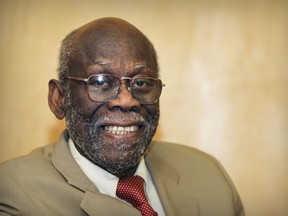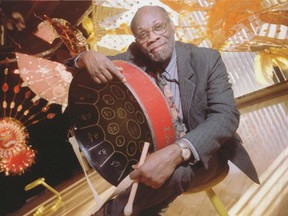Bayne, who died on Sunday, is remembered as a “guiding light” who opened doors for countless others in Montreal’s Black community.

Article content
Dr. Clarence Bayne, a longtime educator, advocate and leader in Montreal’s Black community, died on Sunday. He was 91.
A founding member of the Black Studies Centre and Black Theatre Workshop in the early 1970s, Bayne is remembered as a cornerstone of the community who remained committed to his advocacy into his later years.
“Dr. Bayne was a pillar of strength and a guiding light for our community,” the Black Community Resource Centre wrote on Tuesday. “His lifelong dedication to championing the rights and voices of the English-speaking Black community in Quebec has left a profound impact on all of us.”
Advertisement 2
Story continues below
Article content
Beyond his life-long involvement with several institutions of the Black community, Bayne was also a professor and lecturer at Concordia University. In the early 1990s, he was part of a group that pushed for then-mayor Jean Doré to recognize Black History Month in Montreal.
Born in Trinidad, Bayne arrived in Canada in 1955 to attend the University of British Columbia. By 1964, he was in Montreal. He would later speak eloquently of the racism he witnessed as as a rising economist working for CN Rail and as a PhD candidate at McGill University.
His work and accomplishments have often been highlighted through the years, and his honours have included a Governor General’s Award and the Black Theatre Workshop’s Martin Luther King Jr. Award.
“(Bayne was) Montreal’s English language theatre community’s greatest advocate and supporter, dedicating countless hours and resources to its success,” the Black Theatre Workshop, Canada’s oldest Black theatre company, wrote in a social media post on Tuesday.
“Balancing his involvement with numerous other companies and associations,” it added, “he has consistently not only opened doors and uplifted others, but through his life of advocacy, ensured that those doors remained open.”
Article content
Advertisement 3
Story continues below
Article content
In a 1996 interview looking back at his career, Bayne told The Gazette at the time the Black Theatre Workshop, created in the early 1970s, was one of his proudest achievements.

“Despite the difficulties of funding, the difficulties of still not being seen as the equivalent of francophone theatre or high-art end English theatres, despite all of these things, it has found ways to survive and to be respected in many circles,” he said.
Speaking of his work at large in the Black community, Bayne added he had no intentions of ever slowing down.
“Although there have been major changes, progress has to continue,” he said.
More recently, Bayne spoke out against the Quebec government’s plan to eliminate school boards in 2019 and its language reform law, Bill 96. In 2020, he also spoke in support of the large protests against systemic racism and police violence seen across the province.
In a post on X on Tuesday, Côte-des-Neiges — Notre-Dame-de-Grâce borough Mayor Gracia Kasoki Katahwa remembered Bayne for his tireless work and contributions.
Advertisement 4
Story continues below
Article content
“His leadership and commitment opened doors for many,” Kasoki Katahwa wrote, “and his impact will be felt for generations.”
A member of Bayne’s family confirmed his death on social media this week. Funeral arrangements are still being finalized.
Recommended from Editorial
Advertisement 5
Story continues below
Article content
Article content



Comments